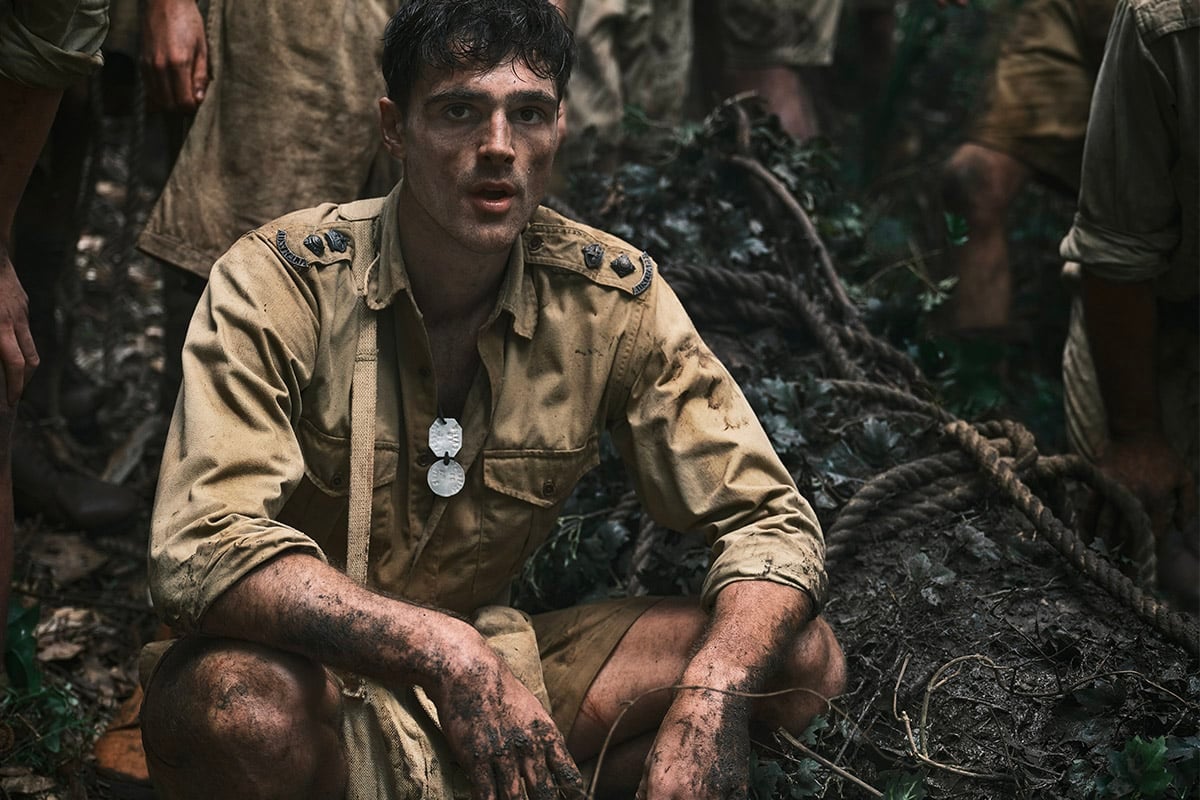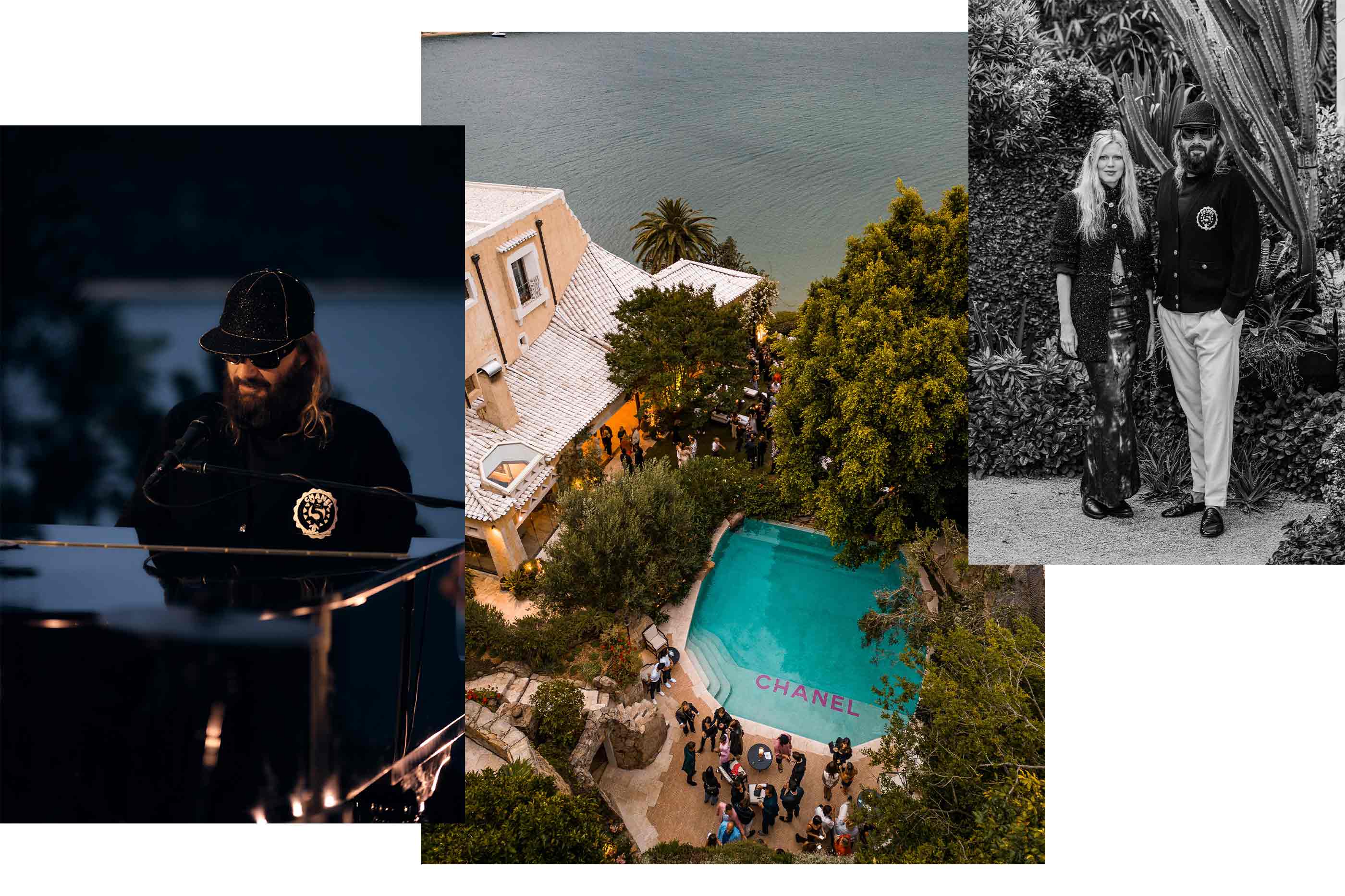
One of the few things more beautiful than a jasmine perfumed Sydney summer evening, is one spent with Sébastian Tellier. It has been some time since I have seen Tellier live; although it feels only a few years ago, 2008 is a little distant in time now. Far from the sticky-floored club in which I first saw Tellier play, this open space – complete with a black grand piano raised on an architectural stage – recontextualises his performance. The performance is transcendent yet human, intimate yet open and gave something to those who knew and have followed his journey. We were given a deeper insight into his craft and an understanding of the song outside of the record and traditional venues. I consider Tellier’s artistic trajectory, from Eurovision to friend of the House of CHANEL, marrying the absurd with the artful, the masculine with the feminine, the commercial with the avant garde, and the definitively French with the international.
Whilst his music and artistic spirit is progressive, Tellier certainly has a penchant for the male-female duet that has defined French pop music, from Serge Gainsbourg to the present. When we meet after his spellbinding performance, I ask him about the CHANEL Cruise event where he performed duets with Vanessa Paradis, Charlotte Casiraghi, Juliette Armanet and Angèle. Having performed individually with Tellier, these four muses of the Maison gathered around Tellier’s white grand piano in the open air, sat on the stone steps like an angelic chorus dressed in CHANEL. The visual impact of the Monaco show, interplayed with the idea of the classic male-female duet that is part of the French Pop Canon; Paradis’ feminine sheer cape contrasting with Tellier’s more structured, masculine jacket – like the sailor of a sonic ship. I posit the idea that this format, the male-female duet, is a sexual chemistry elevated into art for the French, to which Tellier replies, “I guess in France, love is really important, it’s not an insignificant feeling.” Slipping into French, which I am trying to translate on the fly, Tellier expands on the nature of love. “The love feelings are so strong – dominant. It’s more important than money. I love money, of course [laughing], but I love Love more.”
Drifting from the nature of a duet, I am gifted some invaluable life advice from Tellier. “In life, symbols of strength or machoism are not what really make us strong, what is important is love. I guess most of the French songs talk about love, not just because it is a tradition but because it is the pinnacle of success, culturally. It’s like a fine wine, because, when you drink wine, you want to be loved, you become intoxicated by the most powerful of feelings. Life is not enough, you need love.” And perhaps a fine French wine.
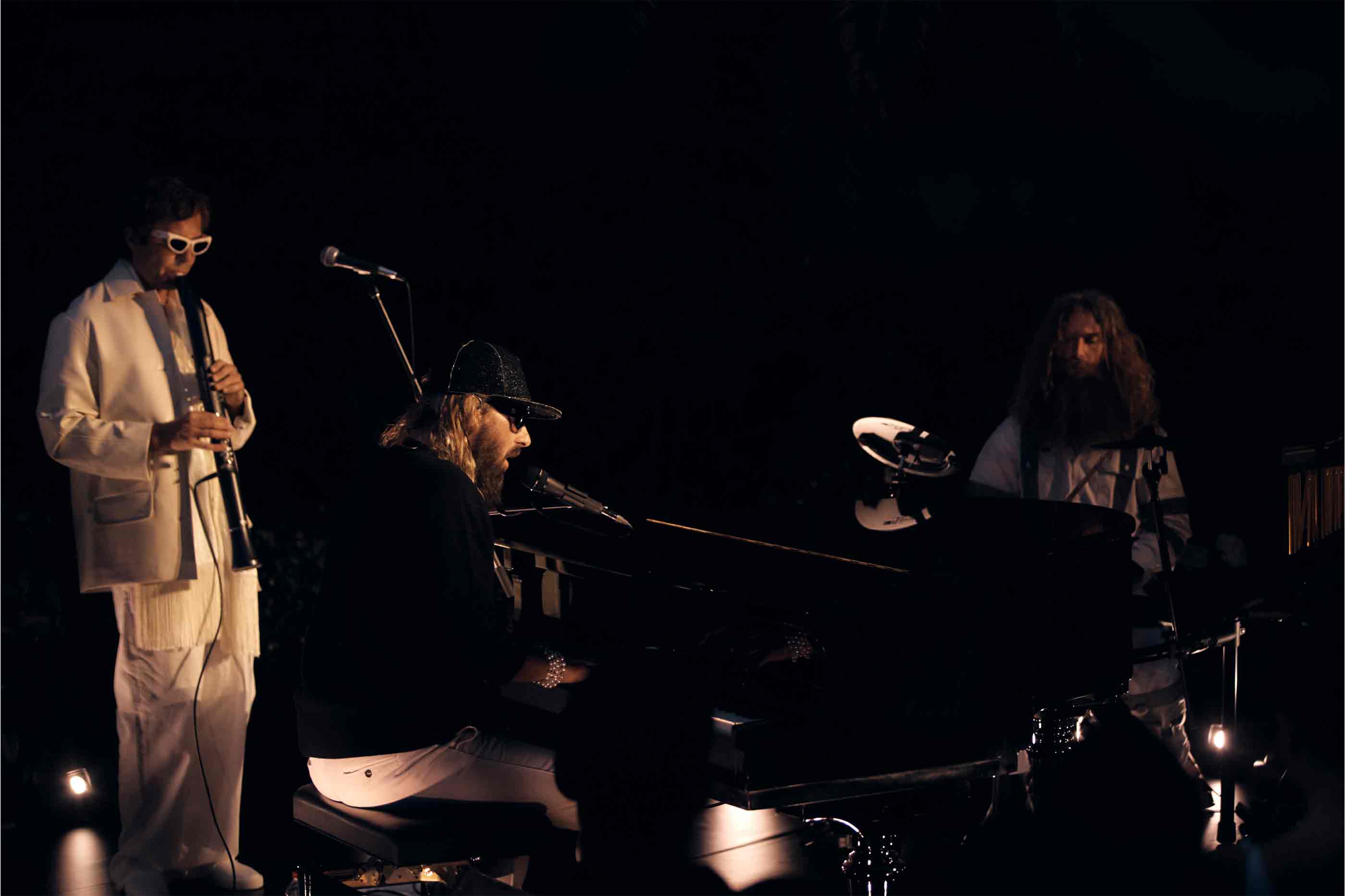
I study Tellier’s face behind his ever-present sunglasses and consider his aesthetic as one of the few men to be dressed by CHANEL and having had custom designs made for him by the late Karl Lagerfeld. We begin to speak about his on-stage style. Tellier tells me, “Before CHANEL, I felt like a clown,” (charmingly pronounced clune). “I would do my job, perform in my shiny attention grabbing jackets, but it was not ‘CHANEL’, it lacked the substance and elevation. I was just always missing something, you know? Something classic, and when I wear CHANEL, I feel different.” Perhaps Tellier is of the school of thought in which your presentation of self reflects your values, as he elaborates, “For me, this is the way to live life, to be sophisticated, authentic, to be pure. Because [CHANEL] is handmade, it’s not factory-made garbage, it’s pure. It has real humanity within it, I love that a lot.”
Tellier, whilst in awe of the authenticity and sophistication of the brand, is deeply playful and aware of the semiotics of dress and how the wearer can change the meaning of the garment entirely. With a gesture not dissimilar to a proud child at ‘show and tell’ he pulls his CHANEL bag onto his shoulder, and says “I have my ‘woman bag’ yet when I wear it, it’s a man bag.” Evidently, Tellier believes in the transformative nature of gender in art and fashion, he takes control of his things of beauty and repurposes them for his own artistic needs.
Tellier reflects on how the interplay with gender norms has been a lifelong fascination, and tells me, “A long time ago, when I was seven, my father’s company threw a Christmas party with a huge tree being the focal point. All of the children were invited to choose whatever toy they wanted, and me, well I chose a Barbie. She had a beautiful pink campervan, I remember at seven realising I prefer girl’s toys over boys. In this way, I think I was already in the ‘CHANEL Mood’ because I was choosing beauty over everything else. I chose Barbie because she was so beautiful.” I muse that in medieval times pink was the masculine colour and that the flip to pink being for girls was a relatively recent cultural shift, to which I am met with laughter and, “Oui, oui, I’m sure. I must be from another time.”
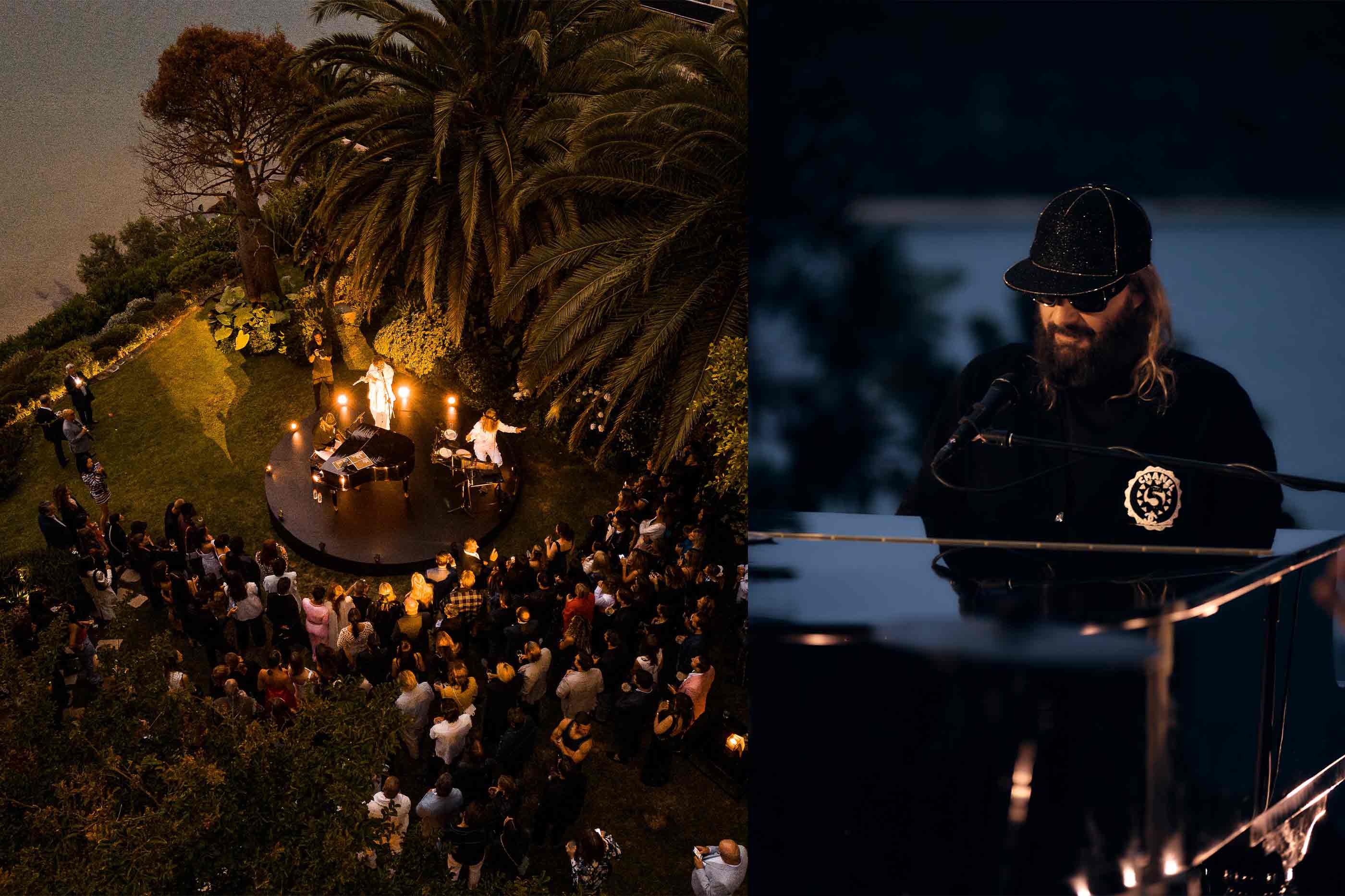
For Tellier, art is a genderless, ruleless place where self expression irrespective of identification rule supreme. The goal is to make a statement and be impactful with your visuals whether they manifest as traditionally masculine or feminine. Tellier is clearly madly in love with his wife, Amandine, who performed with him earlier in the evening. There was such reverence for the performance and the connection between the two musicians as they worked together, it felt as though the audience had been let into their relationship. We were listening to their connection, which really emphasised the canonical male female partnership of French Pop Music. Ever the admirer of his wife, and subsequently her shoes, Tellier confesses that he often wants to buy them for her to enjoy; “I’m just the kind of guy that can see beauty for beauty’s sake, even in a shoe, I just love shape and the beauty however it is presented.” Tellier is a wholistic artist, who speaks to the need to give from your mind, your aesthetic, your heart and your inner strength and identity – speaking like a philosopher he muses on these being the instruments for a good life. “If you love the bottom of the brain, you also love the top. It’s a balance. For me, to live a well-balanced life, you have to be strong deep inside. Strong in your image, and strong with what you give to the world. It is not about what you say, but what you are… I often say more with my outfit than with my mouth.”
It would be sacrilegious not to ask Tellier about his French idols, given that he is so often compared with French pop music royalty, and he tells me that Gainsbourg is the King, and Piaf the Queen, naturally. With a fusion of humility, reverence, and assurance of his place in the court, Tellier does not profess to be the Prince, but “the guy underneath.” That said, there is an understanding of this comparison with the greats, and it is one linked through honesty and authenticity. Tellier explains, “We have a link, and this link is when we sing a song, it is not futile, French singers explain who we are and it’s deeper [than the words]. You can’t lie. It’s truly honest.” Tellier elaborates, saying, “When you hear a French song and it is not honest, you can tell immediately! We prefer in France someone who says they are bad outright, than someone who is disingenuous and pretends to be good, but it is fake. You can feel this honesty and purity in the music, it is present in the voice, or it is not.”
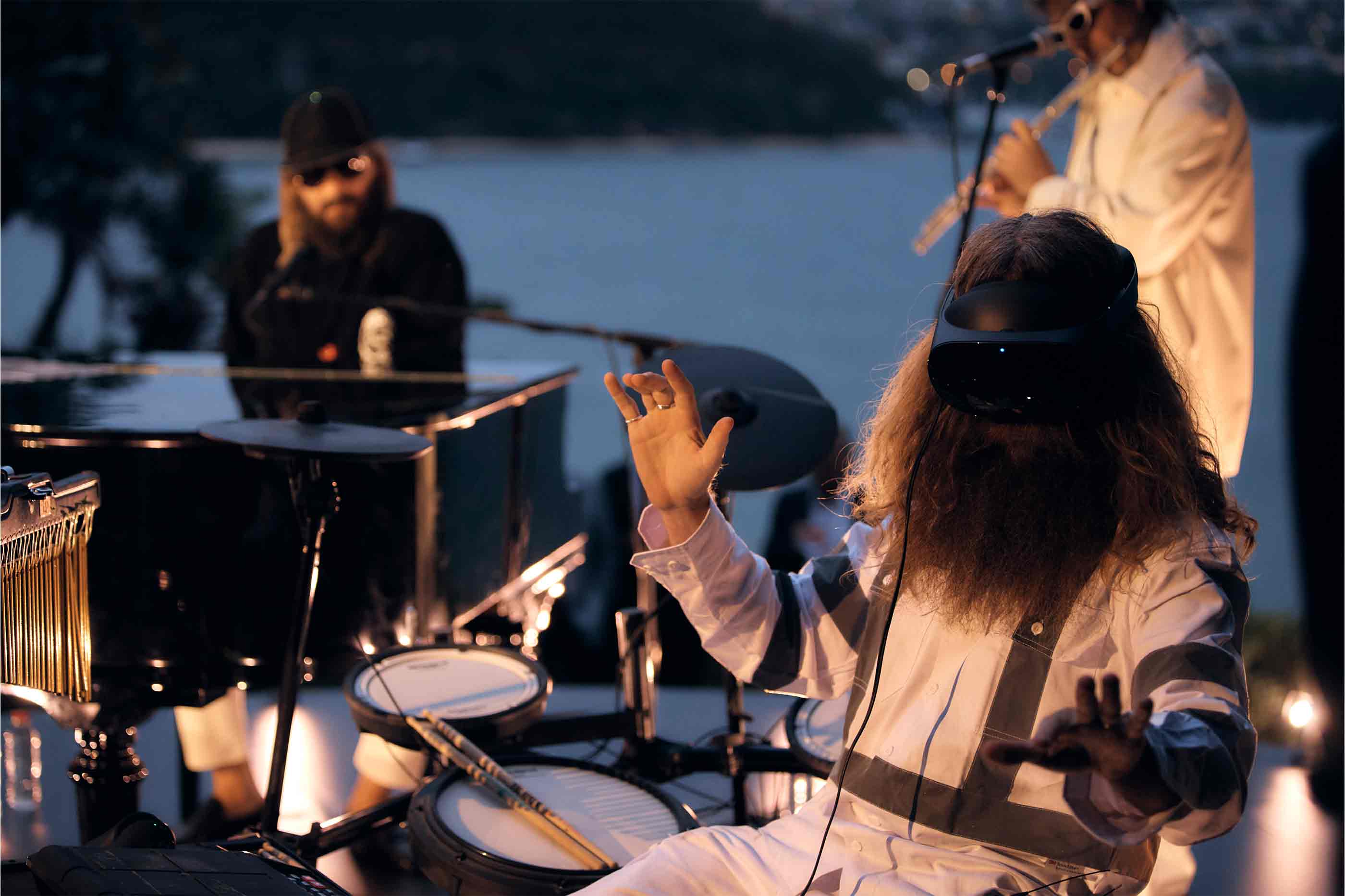
Tellier is more than a chantuer, and has composed music for films such as Narco and Steak and maintains a friendship with Sofia Coppola. Watching him improvise within the songs, in such a stripped back live environment, his nuanced musicality for soundtracking came to the fore. As much as the French are great musicians, they have a penchant for producing great directors. Given that the evening had been so cinematic, with a pastel twilight providing the backdrop to his performance, I am compelled to ask about the late, great Godard, with whom he shares such a decidedly French fusion of beauty and absurdism. Tellier reflects, “I remember when I saw the films of Godard as a teenager with my friends, it was impossible to fall asleep because we were laughing so much, we thought he was so hysterical and absurd. It was crazy to us at the time, this guy [Godard] is like a bee, stinging us.” Perhaps Tellier sees Godard as a contemporary Socrates, stinging us into knowledge; either way, there was no sleep due to the excitement.
Tellier’s conversational and playful nature allows one to lose complete track of time, I notice my time is drawing to a close, so we depart from classical philosophy and return to music. Hoping to gain more insight into the performance of a song, rather than its inherent written truth, I ask which version of Je t’aime, moi non plus is Tellier’s favourite. Being English, I am relieved to hear that it is the version with Jane Birkin. “The second time Serge Gainsbourg tried this song with Jane Birkin, it was just so beautiful,” Tellier says, his voice lilting with song as he conjures the concept in his mind’s eye. With wistful romance, Tellier continues, “Jane Birkin has the more charming voice, Brigitte Bardot, she was beautiful but not the same voice, not the same authenticity. The second one was definitely the best.” The elation and inspiration one can feel talking to an artist who values authenticity over technicality is a hard feeling to express, but certainly one experienced within our conversation. Tellier speaks with the authenticity he values; his honesty transcends language and is reflected in a tone of voice that is universal. Having traversed the ‘golden avenues’ of Tellier’s mind for but a few moments, I find the innate musicality in his speaking voice becomes educative and illuminates his artistic style. The understated power of a person who speaks to your heart, but never takes off their sunglasses, is not to be underestimated.



